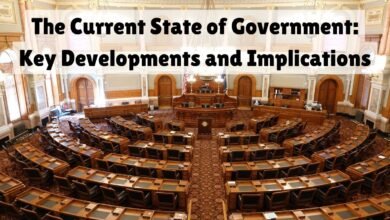BJP retains Arunachal Pradesh, SKM re-elected with resounding mandate in Sikkim
"BJP retains power in Arunachal Pradesh, while SKM is re-elected with a resounding mandate in Sikkim. Get the latest updates."

The recent state elections in Northeast India have brought significant political developments, with the Bharatiya Janata Party (BJP) successfully retaining its hold on Arunachal Pradesh and the Sikkim Krantikari Morcha (SKM) securing a resounding mandate in Sikkim. This blog post aims to provide a detailed overview of these election results, shedding light on the parties involved, the voter sentiments, and the broader implications of these outcomes. Through a comprehensive analysis, readers will gain a clear understanding of the current political landscape in both Arunachal Pradesh and Sikkim.
In Arunachal Pradesh, the BJP’s continued dominance underscores its strategic foothold in the region, reflecting strong voter support and effective governance. The party’s ability to retain power speaks to its successful campaigning and the resonance of its policies among the local populace. Meanwhile, in Sikkim, the SKM’s re-election with a decisive mandate highlights the electorate’s confidence in the party’s leadership and vision for the state. The SKM’s triumph not only reinforces its position but also signals the electorate’s endorsement of its development agenda.
This blog post will delve into the key factors that contributed to these electoral victories, examining both regional and national influences that shaped voter preferences. It will explore the strategic maneuvers by the BJP in Arunachal Pradesh and the SKM’s approach in Sikkim, offering insights into the political dynamics at play. Furthermore, we will assess the future prospects for both states, considering how these electoral outcomes might influence governance, policy-making, and regional stability.
By the end of this post, readers will have a nuanced understanding of the significant political shifts in Arunachal Pradesh and Sikkim, equipped with knowledge about the recent electoral processes and their broader implications. This analysis aims to provide a well-rounded perspective on the evolving political scenarios in these northeastern states.
BJP’s Victory in Arunachal Pradesh
The Bharatiya Janata Party (BJP) has successfully retained its position in Arunachal Pradesh, capturing a substantial number of seats in the state assembly. The party’s campaign strategy was meticulously crafted, focusing on pivotal issues that resonated deeply with the electorate. The BJP’s campaign was marked by a blend of traditional outreach and modern digital engagement, ensuring a broad and effective reach across the state’s diverse demographic landscape.
Campaign Strategy: The BJP’s campaign strategy in Arunachal Pradesh hinged on promises of accelerated development and enhanced infrastructure. Key slogans such as “Sabka Saath, Sabka Vikas, Sabka Vishwas” (Together with All, Development for All, Trust of All) were prominently featured, underscoring the party’s commitment to inclusive growth. The party also leveraged digital platforms to engage with younger voters, while simultaneously conducting grassroots-level rallies and meetings to connect with rural communities.
Notable Candidates: Among the influential candidates were Pema Khandu, the incumbent Chief Minister, and Bamang Felix, the Home Minister. Pema Khandu’s leadership in the Tawang constituency was instrumental in maintaining the party’s stronghold, while Bamang Felix’s efforts in the Nyapin constituency showcased his commitment to local governance and security. These candidates, along with others, played crucial roles in reinforcing the BJP’s vision for the state.
Voter Turnout: The state witnessed a robust voter turnout, with approximately 75% of the electorate casting their ballots. The engagement was notably high among younger voters and women, reflecting a growing political consciousness across diverse demographic groups. This significant turnout underscored the electorate’s keen interest in the governance and future development of Arunachal Pradesh.
Key Issues: Development and infrastructure were at the forefront of voter concerns. The electorate prioritized issues such as road connectivity, healthcare facilities, and educational institutions. Additionally, local governance and transparent administration were critical factors that influenced voter preferences. The BJP’s focus on addressing these issues through tangible projects and policy initiatives resonated strongly with the voters.
Pros and Cons of BJP’s Governance in Arunachal Pradesh
Pros:
- Significant infrastructure development, including road and bridge projects.
- Enhanced healthcare and educational facilities in rural areas.
- Improved local governance and administrative transparency.
Cons:
- Challenges in addressing pervasive unemployment among youth.
- Environmental concerns associated with rapid infrastructure development.
- Instances of bureaucratic delays in project implementation.
SKM’s Resounding Mandate in Sikkim
The Sikkim Krantikari Morcha (SKM) has secured a resounding mandate in the recent elections, reflecting robust voter support across Sikkim. The party’s campaign was marked by strategic initiatives and a strong connection with the electorate, leading to a decisive victory.
Campaign Highlights
SKM’s campaign was characterized by a focus on grassroots engagement and the implementation of policies that resonated with the local populace. Key initiatives included promises of economic development, improved infrastructural projects, and enhanced social welfare programs. The party’s ability to address local issues, such as unemployment and rural development, played a crucial role in garnering voter support.
Leadership
The leadership of SKM, particularly Chief Minister Prem Singh Tamang, was instrumental in the party’s success. Tamang’s leadership style, which combines accessibility with decisive action, has made him a popular figure among Sikkim’s electorate. His commitment to transparency and accountability has further solidified the party’s standing. The popularity of other key leaders, who have maintained a strong presence in their respective constituencies, also contributed to SKM’s victory.
Voter Sentiments
The electorate’s primary concerns revolved around economic stability, job creation, and infrastructural development. SKM’s ability to address these issues through tangible policy proposals and past achievements created a strong bond of trust with the voters. Additionally, the party’s focus on preserving Sikkim’s cultural heritage and promoting sustainable development resonated well with the electorate, further cementing their support.
Election Results
In the election results, SKM secured a clear majority, winning a significant number of seats in the Sikkim Legislative Assembly. The party’s vote share was indicative of widespread support across various demographics and regions within the state. This comprehensive victory not only underscores the effectiveness of SKM’s campaign but also reflects the electorate’s confidence in the party’s governance.
Pros and Cons of SKM’s Governance in Sikkim
| Pros | Cons |
|---|---|
| Strong focus on economic development and job creation | Concerns about environmental sustainability in development projects |
| Improved infrastructure and social welfare programs | Challenges in managing rapid urbanization |
| Transparent and accountable leadership | Need for more comprehensive long-term planning |
| Preservation of cultural heritage | Balancing modernity with tradition |
Implications and Future Prospects
The recent election results in Arunachal Pradesh and Sikkim carry significant implications for regional politics, development initiatives, and interstate relations. The re-election of the Bharatiya Janata Party (BJP) in Arunachal Pradesh and the Sikkim Krantikari Morcha (SKM) in Sikkim underscores a continuity in governance that may influence various aspects of the northeastern region’s political and socio-economic landscape.
Regional Politics
The political dynamics in the northeastern region are likely to be influenced by the stability brought about by the re-election of existing governments. The BJP’s victory in Arunachal Pradesh reinforces its political dominance in the region, potentially leading to stronger cohesion among northeastern states under its influence. This could foster a more unified approach to regional issues, including security and infrastructure development. Conversely, the SKM’s resounding mandate in Sikkim may embolden the party to assert its regional agenda more confidently, potentially leading to new political alignments and collaborations.
Development Initiatives
Both Arunachal Pradesh and Sikkim are poised to prioritize development projects that can drive economic growth and improve living standards. In Arunachal Pradesh, the BJP is expected to focus on infrastructure projects, such as road connectivity and power generation, to boost economic integration with the rest of India. Meanwhile, the SKM in Sikkim may continue its emphasis on sustainable development, promoting eco-friendly tourism and organic farming. These initiatives not only promise economic benefits but also aim to preserve the unique cultural and environmental heritage of the region.
Interstate Relations
The election outcomes may also impact interstate relations within the northeastern region. Improved political stability in Arunachal Pradesh could lead to enhanced cooperation with neighboring states on issues such as border security and trade. In Sikkim, the SKM’s strong mandate may prompt a more proactive stance in regional forums, potentially influencing policies on water sharing and environmental conservation. These developments could foster a more collaborative environment among northeastern states, benefiting the region as a whole.
Future Challenges
Despite the promising prospects, the newly elected governments in Arunachal Pradesh and Sikkim will face several challenges. In Arunachal Pradesh, addressing infrastructure deficits and ensuring equitable development across diverse communities will be critical. The BJP will need to balance development with the preservation of indigenous cultures and traditions. In Sikkim, the SKM must navigate the complexities of sustainable development while managing the expectations of its electorate. Ensuring that economic growth does not compromise environmental integrity will be a key challenge.
Conclusion
Re-election of the BJP in Arunachal Pradesh and the SKM in Sikkim presents both opportunities and challenges. The potential for enhanced regional cooperation, economic development, and political stability is significant. However, both governments must navigate complex socio-economic landscapes to fulfill their mandates effectively. As they embark on their new terms, their ability to address these challenges will determine their success in shaping the future of their respective states and the northeastern region at large.



